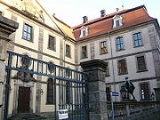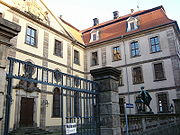
Adolphus von Dalberg
Encyclopedia

Germany
Germany , officially the Federal Republic of Germany , is a federal parliamentary republic in Europe. The country consists of 16 states while the capital and largest city is Berlin. Germany covers an area of 357,021 km2 and has a largely temperate seasonal climate...
Benedictine Prince-Abbot
Prince-abbot
A Prince-Abbot is a title for a cleric who is a Prince of the Church , in the sense of an ex officio temporal lord of a feudal entity, notably a State of the Holy Roman Empire. The secular territory ruled by the head of an abbey is known as Prince-Abbacy or Abbey-principality...
of Fulda Abbey and founder of the former university in the same city — University of Fulda
University of Fulda
The University of Fulda , was founded in 1734 by Adolphus von Dalberg and existed until 1805. Most of the students and professors were Catholic...
.
Biography
Adolphus von Dalberg, born into a long-established noble family of southern Germany, after holding the office of provostProvost (religion)
A provost is a senior official in a number of Christian churches.-Historical Development:The word praepositus was originally applied to any ecclesiastical ruler or dignitary...
at Celle
Celle
Celle is a town and capital of the district of Celle, in Lower Saxony, Germany. The town is situated on the banks of the River Aller, a tributary of the Weser and has a population of about 71,000...
in Hanover
Hanover
Hanover or Hannover, on the river Leine, is the capital of the federal state of Lower Saxony , Germany and was once by personal union the family seat of the Hanoverian Kings of Great Britain, under their title as the dukes of Brunswick-Lüneburg...
for some years, was elected Prince-Abbot of the Benedictine Fulda Abbey
Fulda monastery
The monastery of Fulda was a Benedictine abbey in Fulda, in the present-day German state of Hesse. It was founded in 12 March, 744 by Saint Sturm, a disciple of Saint Boniface, and became an eminent center of learning with a renowned scriptorium, and the predecessor of the Fulda...
in 1724.
Though he was not a bishop
Bishop
A bishop is an ordained or consecrated member of the Christian clergy who is generally entrusted with a position of authority and oversight. Within the Catholic Church, Eastern Orthodox, Oriental Orthodox Churches, in the Assyrian Church of the East, in the Independent Catholic Churches, and in the...
, Dalberg had quasi-episcopal jurisdiction
Ecclesiastical jurisdiction
Ecclesiastical jurisdiction in its primary sense does not signify jurisdiction over ecclesiastics , but jurisdiction exercised by church leaders over other leaders and over the laity....
on the territory belonging to the abbey and held a diocesan synod in 1729. This privilege of quasi-episcopal jurisdiction was granted to the abbots of Fulda by Pope Zachary
Pope Zachary
Pope Saint Zachary was Pope of the Catholic Church from 741 to 752. A Greek from Calabria, he was the last pope of the Byzantine Papacy...
in 751.
Dalberg spared no pains to improve the Roman Catholic educational facilities of Fulda. Its once famous school, which had suffered severely during the religious upheaval of the sixteenth century, had regained some of its ancient prestige by the united efforts of the Jesuits and Benedictines. Dalberg hoped to restore in all its splendour the ancient seat of learning which had made Fulda world-renowned during the Middle Ages
Middle Ages
The Middle Ages is a periodization of European history from the 5th century to the 15th century. The Middle Ages follows the fall of the Western Roman Empire in 476 and precedes the Early Modern Era. It is the middle period of a three-period division of Western history: Classic, Medieval and Modern...
.
With this end in view he founded a university at Fulda which came to be known after his own name as the Alma Adolphina. The faculties of philosophy and theology he formed by united the two existing schools of the Jesuits and the Benedictines; for the new faculties of jurisprudence and medicine he engaged other professors. Pope Clement XII granted the charter of foundation on 1 July 1732, and Emperor Charles VI, the charter of confirmation on 12 March 1733. The solemn inauguration of the university took place on 19 September 1733.
Adolphus von Dalberg died on 3 November 1737 at Hammelburg
Hammelburg
Hammelburg is a town in the district of Bad Kissingen, in Lower Franconia, Bavaria, Germany. It is situated on the river Franconian Saale, 25 km west of Schweinfurt...
in Lower Franconia
Lower Franconia
Lower Franconia is one of the three administrative regions of Franconia in Bavaria , Germany ....
.
His foundation, the Adolphina, was however not destined to be of long duration. After the suppression of the Jesuit Order by Pope Clement XIV
Pope Clement XIV
Pope Clement XIV , born Giovanni Vincenzo Antonio Ganganelli, was Pope from 1769 to 1774. At the time of his election, he was the only Franciscan friar in the College of Cardinals.-Early life:...
in 1773 the university came entirely into the hands of the Benedictines, who were finally obliged to discontinue it in 1805, in consequence of the Napoleonic secularization
Secularization
Secularization is the transformation of a society from close identification with religious values and institutions toward non-religious values and secular institutions...
of Fulda Abbey in 1802.

